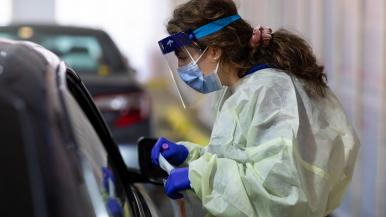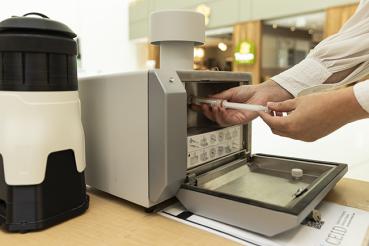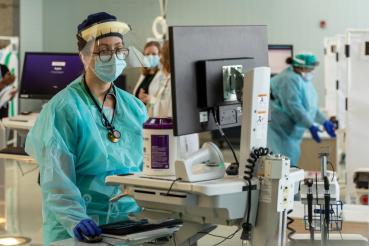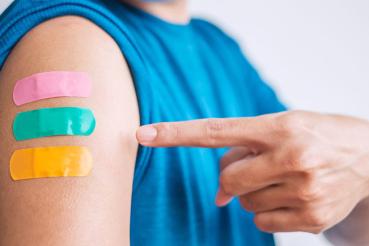With cases of COVID-19 again on the rise in portions of Illinois and across the country, the Chicago Department of Public Health is partnering with Rush University Medical Center and Esperanza Health Centers to redouble efforts on something that remains of critical importance: COVID-19 testing.
Both the Medical Center and Esperanza Health Centers have a history of commitment to addressing health equity in the neighborhoods they serve. As vaccine hesitancy continues to be an issue in pockets of Chicago, CDPH, Rush and Esperanza are working to leverage trusted relationships to increase testing in these areas and support communities disproportionately affected by COVID-19.
“Connect Chicago is an opportunity for Rush to take critical health services into South, West, and Southwest communities of Chicago,” said Alma Blancarte Mora, RN, Rush College of Nursing Community Health Nurse leader. “We wanted to use this patient encounter as an opportunity to do more than COVID-19 testing and to be thoughtful about what our communities need. COVID-19 isn’t going to last forever, but we hope the relationships we build do.”
The teams will provide community-based testing along with education and connection to care.
"As the pandemic enters a new phase, CDPH's community-based testing efforts continue to prioritize equitable access to COVID-19 diagnosis for the communities that need it most, and we are proud to be working with the Medical Center and Esperanza Health Centers, two Chicago-based health care providers, to connect people to COVID-19 testing and additional health care services too, including COVID-19 vaccination,” said Dr. Allison Arwady, CDPH commissioner. “COVID-19 testing remains a critical part of our public health response but the most important thing you can do to protect yourself and your family from COVID-19 right now is to get vaccinated.”
The program is now active, using a three-pronged strategy of high-volume testing, education and connection to care to maximize the reach of testing across the city. The spread of the Delta variant of COVID-19 has again heightened concern about community spread and with it, anxiety that can only be eased by easy access to testing and vaccinations.
“With rates of fully vaccinated individuals struggling to rise above 40 or 50 percent in some areas of the city, it is clear the communities we serve remain at increased risk for COVID-19,” said Carmen Vergara, chief operations officer at Esperanza.
“This partnership with Rush University Medical Center and the Chicago Department of Public Health will ensure that we are prepared for any increase in demand for testing, even as we redouble our efforts to educate and vaccinate residents of our community.”
Blancarte Mora hopes that this outreach will also serve as a pathway for community members to broaden access to other care needs.
“Beyond this COVID-19 era, we want people to be connected to care for all other medical needs,” added Blancarte Mora. “Additionally, we wanted to make sure we made time for every patient encounter to be educational by allowing enough time to answer any COVID-19- and health care-related questions to debunk any myths often shared through social media.”
During a testing visit, a registered nurse will ask every client if they have a primary care provider or need to be connected to other health care services, and if they don’t, the nurse will ask if they wish to connect to care at the Medical Center or Esperanza Health Centers. The Medical Center will also connect with community-based organizations to bring awareness to community resources.
How it works:
High-Volume Testing: High-volume testing will involve static locations in two neighborhoods and one mail-in testing option for Chicago residents living in any neighborhood disproportionately impacted by COVID-19. One site is a walk-in static location, to be staffed by Rush in Second Federal Bank in La Villita, Chicago. Little Village has been a neighborhood where rates of transmission have been alarmingly and consistently high throughout the pandemic.
Esperanza Health Centers — which have delivered nearly 31,000 COVID-tests since the beginning of the pandemic — will conduct drive-thru testing at its Brighton Park location, as well as in-clinic testing at all its sites on the West and Southwest sides. Together with the Medical Center, the partnership will have capacity to provide 920 tests a day, six days a week and 100 tests on the seventh day — for more than 5,600 COVID-19 tests per week in some of the hardest-hit neighborhoods of the city.
The third approach is at-home mail-in COVID-19 testing. Community outreach coordinators will bring awareness to community residents that they can order an at-home test kit that will be mailed to their home the following day. Community outreach coordinators will focus on areas of the city that need more testing based on CDPH recommendations.
Education: On-site support will be from clinical staff including registered nurses and non-clinical staff such as community health workers. Education opportunities from clinical staff and community health workers will ensure that community members understand key concepts of COVID-19.
A nursing support phone line will also be available during business hours for community members to call and ask for help navigating their results and next steps for proper care.
Connection to Care: Community members needing access to primary care will be connected with Esperanza or the Medical Center for appointments. Clinical staff will assist patients in determining if, and when, they need higher levels of care, such as emergency appointments. A community engagement coordinator will work with anchor community-based organizations and other social supports to connect community members to the resources they need.




